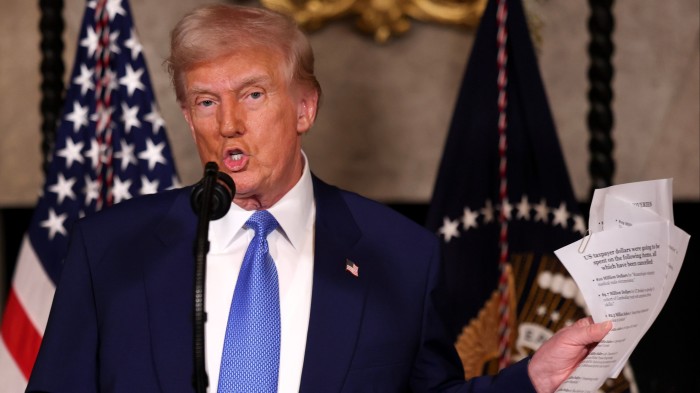Unlock the White House Watch newsletter for free
Your guide to what the 2024 US election means for Washington and the world
Donald Trump is to take greater control of independent federal agencies — including important financial watchdogs — in the US president’s latest move to tighten his grip on government institutions.
The president late on Tuesday signed an executive order that “reins in independent agencies”, ordering them to submit draft regulations for review, the White House said in a statement.
Trump will also set “performance standards” for the agencies, which must “consult” with the White House on “their priorities and strategic plans”.
The order comes as the president seeks to expand the power of the government’s executive branch, with attempts to shut down regulators whose formation is enshrined in federal statutes, while pummeling the civil service with budget cuts and lay-offs.
According to the White House statement, the Constitution “vests all executive power in the president, meaning that all executive branch officials and employees are subject to his supervision”.
“Now they will no longer impose rules on the American people without oversight or accountability,” the White House said.
Agencies targeted by the order include the Securities and Exchange Commission, Wall Street’s top watchdog; the Federal Trade Commission, the antitrust regulator; as well as the Federal Communications Commission, which regulates television, internet services and radio in the US.
Although the Federal Reserve’s supervisory role has been targeted, its monetary policy functions are exempted from the order, the White House said.
It is unclear whether the exemption will be permanent. “The fact that it’s carved out should not mean that we can breathe easy when it comes to the independence of the Fed,” said one analyst who asked not to be named. “Because one executive order carves it out, another executive order could carve it right back in, if it’s legal.”
Critics argue the order is illegal and flouts Congress’s core function of granting regulators power via legislation.
“This is a profoundly dangerous idea for the nation’s health, safety, environment and economy — and for our democracy,” said Robert Weissman, co-president of Public Citizen, a consumer advocacy group. “Congress made independent agencies independent of the White House for good reason.”
He added the “illegal” order “aims to shield corporations from accountability and centralise more power with Trump and his minions”.
Former president Joe Biden appointed progressive regulators to head the agencies, strengthening regulation and enforcement.
The Fed and the SEC declined to comment; the FTC and FCC did not immediately respond to requests for comment.
The Office of Management and Budget would “adjust” funding allocations to federal agencies “to ensure tax dollars are spent wisely”, the White House statement said.
It added Trump and US attorney-general Pam Bondi would “interpret the law for the executive branch, instead of having separate agencies adopt conflicting interpretations”, without elaborating further.
The statement appears to give the president latitude to undermine agencies’ independence while concentrating the power to establish the law in the presidency.
“It’s the opening salvo, if you will,” said Ed Al-Hussainy, rates analyst at Columbia Threadneedle Investments. “We know what the executive branch wants to do here: it’s to bring the institutions into its orbit, it’s in conflict with the mandate set by Congress, and there’s plenty of open room for litigation around this.”
Legal challenges against the order are broadly expected. According to a note by Ian Katz, financial policy analyst at research firm Capital Alpha Partners, the “White House and conservatives not only expect, but want, legal challenges to the executive order”.
“They would like a Supreme Court ruling that further solidifies executive branch authority over the agencies,” Katz added.
Additional reporting by James Politi and Harriet Clarfelt
Read the full article here




